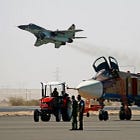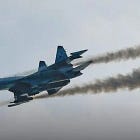Sudanese Air Force kills nearly 200 civilians in attacks on markets
Many children and women killed and wounded in new wave of attacks
Graphic content warning: This article contains videos depicting scenes of graphic violence. These videos are published for the purpose of documenting war crimes and they may not be suitable for general viewing.
The Sudanese Air Force killed nearly 200 civilians and wounded hundreds more, including dozens of children and women, in a new wave of attacks targeting busy markets.
The latest attacks hit the rural towns of Kabkabiya, Al-Kuma, and Melit, the cities of Nyala and El Fasher, and the Khartoum suburb of Hai Mayo.
The attacks follow a year-long pattern of airstrikes against busy markets in areas controlled by the Rapid Support Forces, which typically are carried out on a set market day, with the apparent deliberate intent of maximizing casualties.
On social media, supporters of the Sudanese military boasted about the attacks and justified them, claiming they targeted the “social incubators” of the RSF rebellion.
At least eighty-six (86) people died in the bombing of Kabkabiya on Monday, and dozens more were wounded, including the two children seen in the video above.
Videos filmed in the immediate aftermath of the attack (below) showed chaos on the busy market streets as crowds scrambled to locate loved ones and rescue the wounded, amid burning stores, toppled market stalls, and charred bodies.
Many of the victims were simple merchants, including women who make tea, prepare cooked meals, or sell vegetables or other products for a living.
The Darfur Bar Association issued a statement condemning the “massacre committed today by the army aviation in the city of Kabkabiya.” The lawyers added, “The crimes committed by the two parties to the war continue amid complete international silence.”
Sheikh Adam Abdelrahman, a community leader in Kabkabiya, told Darfur 24 that local authorities had met last week and decided to close the market, in anticipation that it could be bombed. But the decision had not been implemented when eight bombs fell in the market on Monday morning.
Two days before, on Saturday, an airstrike hit a petrol station in Market 6 in Hai Mayo, a suburb of southern Khartoum. According to the Southern Belt Emergency Room, which sponsored a mass grave for the victims, 28 people were killed and 37 wounded, including 29 with burn injuries and 8 with fracture wounds.
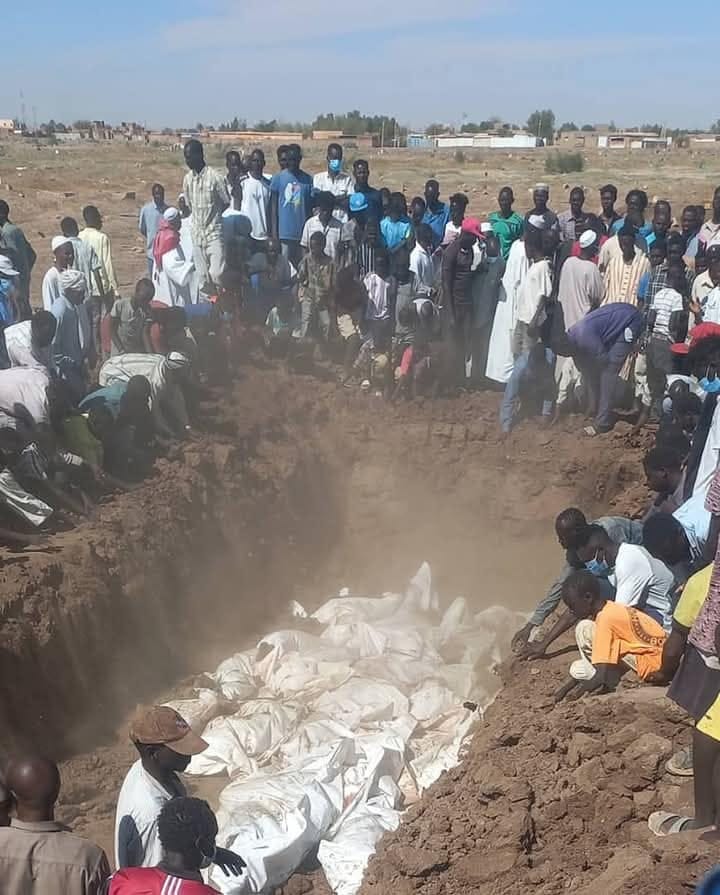
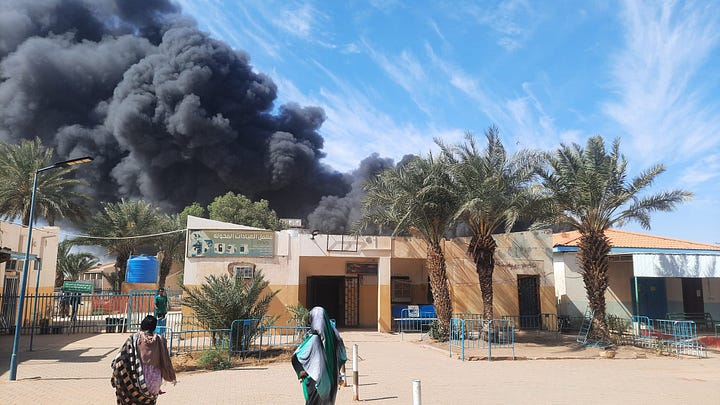
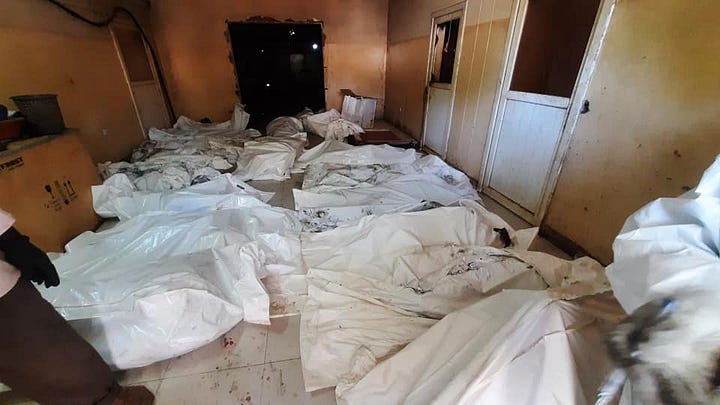
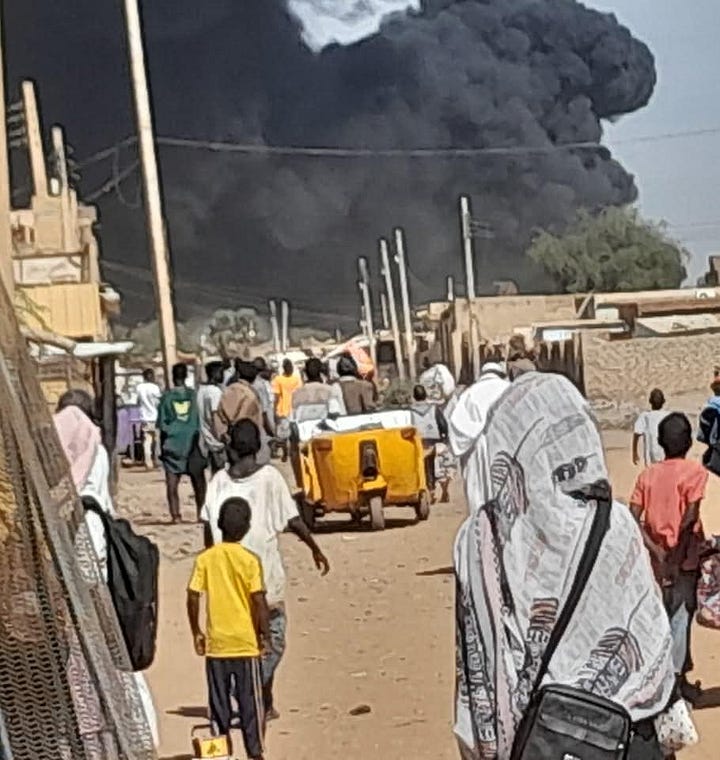
Similarly, bombs landed on a busy market in Al-Kuma, North Darfur on Wednesday, December 4. In speeches at a mass funeral afterwards, local leaders said that the air raid killed 45 civilians and injured more than 200. They said the bombing struck the “heart of the market” and called for a halt to the practice of targeting busy markets.
The UN Migration Agency, IOM, estimated that 246 households were displaced from Al-Kuma as a result of the airstrikes. The UN Children’s agency, UNICEF, issued a statement saying it received information that 13 children were killed in the airstrike in Al-Kuma, and four were injured.
“These attacks on children are unacceptable. Children have no role to play in wars or civil conflict, but children are the ones who are suffering the most as the conflict in Sudan grinds on,” said Sheldon Yett, UNICEF Representative to Sudan. “As the conflict continues unabated, we fear this horrendous pattern will persist. Thousands of children and families are trapped in areas affected by violence.”
The day before, December 3, seven civilians were killed and three injured in an airstrike on a neighborhood in Melit, according to a medical source cited by Darfur 24. UNICEF said that children were among the victims of this attack too, without providing details. Melit has suffered numerous air raids recently, causing many traders to close up shop, deadening the once busy market town and worsening humanitarian and economic conditions in the region, which is suffering from widespread hunger.
Additional airstrikes have taken place at Kab al-Jiddad village in Al-Jazira State, where an unknown number of victims died in an attack on the market on November 24, and at other locations in that state. Additionally, bombs landed Sunday at a border crossing in Renk County, wounding three South Sudanese civilians, according to the governor of Upper Nile State, who spoke with Radio Tamazuj about the incident.
Furthermore, seven civilians died at a mosque in Shambat in Khartoum North as worshippers were leaving Friday prayers, according to a human rights group.
Sudanese military responds
For its part, the Sudanese military issued a statement asserting that it has a “right to deal with any site or facility used by the militia [RSF].” The full statement said:
In the name of Allah, the Beneficent, the Merciful
General Command of the Armed Forces
Press Circular
Tuesday, December 10, 2024 AM
Some political committees affiliated with the terrorist Dagalo militia [the RSF] have been spreading lies after every targeting carried out by our forces against rebel activity sites, while remaining silent about the deliberate and horrific atrocities and violations committed by the militia [RSF] against our citizens and civilian objects throughout the country.
The Armed Forces affirms that it will continue exercising their right to defend the country and to deal with any site or facility used by the militia and its aid for war purposes against the state of Sudan and they are able to do so, God willing.
We also reaffirm our full adherence to the traditional international conflict rules of engagement regarding targeting hostile opposition.
“Victory from Allah is Near.”
Office of the Spokesman in the name of the Armed Forces
General Command of the Armed Forces
Separately, a Facebook page affiliated with the 6th Infantry Division command in El Fasher admitted that the Air Force was responsible for the airstrike in Kabkabiya (which is near El Fasher), as well as other attacks elsewhere in the state.
The statement said that the Air Force targeted “gatherings” in the Kabkabiya area and some other localities, claiming to have inflicted damage on military targets, including a combat vehicle in Kabkabiya with its crew and commander.
“The daily air force quotas and air raids in El Fasher and its surroundings are still continuing at a rate of four to five air raids per day, achieving painful strikes today, destroying 15 combat vehicles and two vehicles carrying ammunition on Kafoot Street and ten vehicles coming from north of El Fasher; the number of dead is 35 and the wounded is 41. It also targeted gatherings in the Kabkabiya area and some localities, and a combat vehicle was destroyed with its crew, including the commander of the force with the rank of lieutenant colonel and a truck carrying weapons and ammunition.”
The full death toll from aerial attacks in Sudan since the start of the war is unknown, but we estimate, based on our continuous open source monitoring, that the number of civilian victims is in the thousands.
Sudan’s Air Force generally lacks warplanes with the capability to identify and hit moving or camouflaged targets, hence why they instead bomb stationary targets like markets and other suspected “gathering places” of the RSF or its alleged supporters. Occasionally, soldiers are present in these markets, but the markets are principally civilian gathering places, not military sites, according to neutral local sources.
Victim statement
A statement published yesterday, attributed to the “The People of Kabkabiya City,” compared these market attacks to the massacres perpetrated by Arab militias affiliated with the Rapid Support Forces elsewhere in Darfur (such as in Ardamata last year), saying that these were war crimes of comparable gravity:
“We, the people of the city of Kabkabiya, condemn in the strongest terms this heinous crime, which is a flagrant violation of all humanitarian and international norms and laws. Targeting civilians and popular markets with warplanes is a full-fledged war crime that cannot be tolerated or justified under any pretext.”
“We hold the Sudanese army leadership fully responsible for these crimes, and call on them to immediately stop targeting innocent civilians. We also affirm that these actions are no different in essence from the crimes committed by armed militias against our people in Darfur.”
Thanks for reading Sudan War Monitor. This post is available free to the public, so feel free to share it. Optionally, please subscribe to support our journalism.
Sudan War Monitor is a collaborative of Sudanese and international journalists and open source researchers tracking the events of Sudan’s war and the search for solutions. We’re building a platform to battle disinformation and warmongering and amplify the voices of victims, humanitarians and peacemakers.
Additional videos from Kabkabiya
⚠️ Graphic content: Viewer discretion strongly advised.
Notice of Correction
Our previous newsletter reported that the Sudanese Congress Party had supported a proposal for the creation of an opposition government-in-exile. Subsequently, a party official informed us that this was not true. Opinions on the matter differ within the opposition Taqaddum block, but the SCP as a party opposes the idea.






